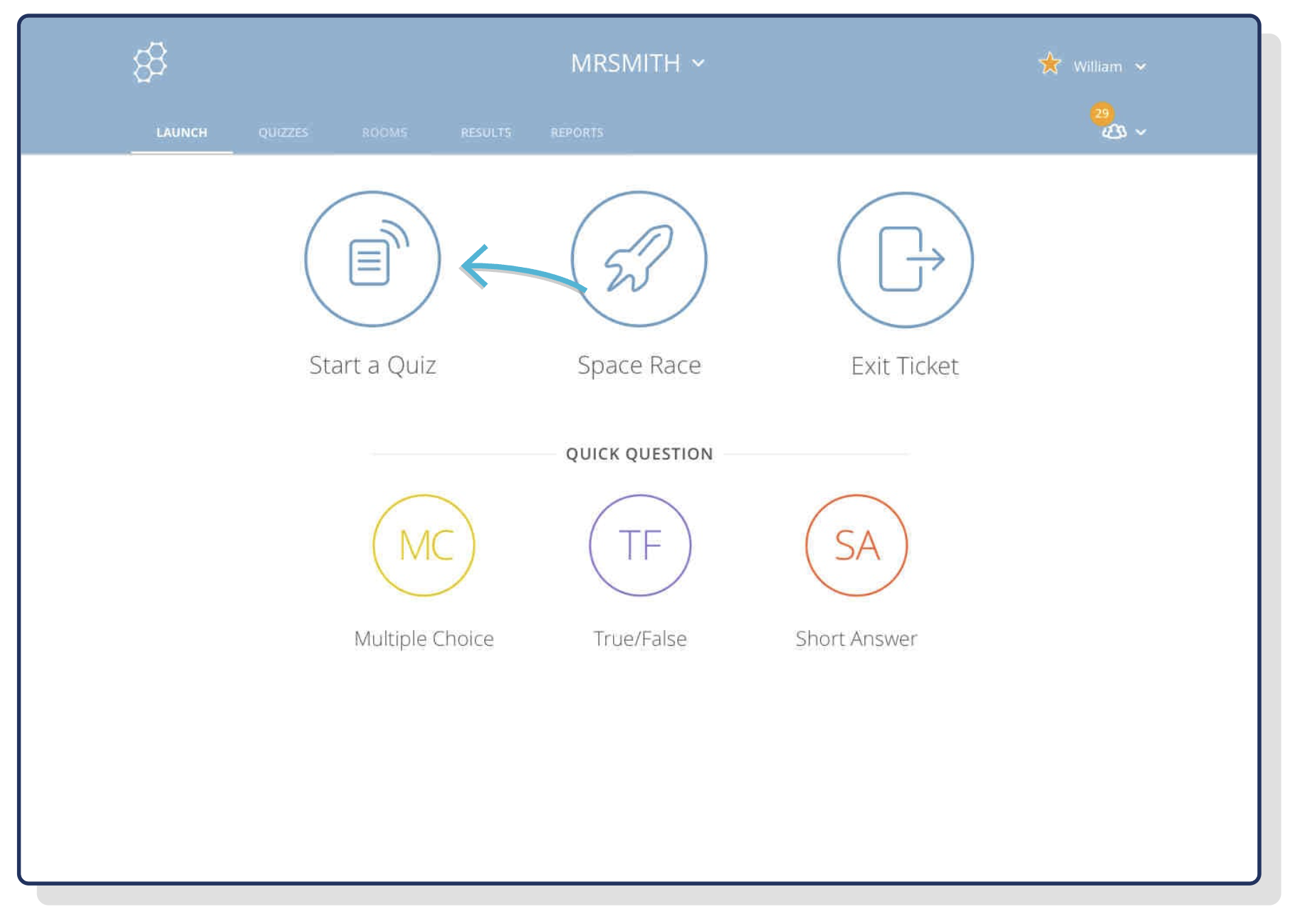Finding a resolution without lengthy legal battles can save time, money, and relationships when conflicts arise, whether in business, the workplace, or personal matters. Conciliation and Mediation are two widely used methods of alternative dispute resolution (ADR) that help parties reach an agreement outside of court.
While both processes aim to foster dialogue and settlement, they differ in structure, approach, and the role of the neutral third party. Considering Conciliation vs Mediation, this guide will help you understand their differences, benefits, and when to choose each method.
Key Takeaways
- Mediation and Conciliation are effective alternatives to litigation for resolving disputes.
- Mediators facilitate discussions, while conciliators suggest solutions.
- Both methods allow flexible problem-solving without formal court rulings.
- Lawyers can assist in negotiations and formalizing agreements.
What is Mediation?
Mediation is an informal yet structured process where a neutral mediator facilitates discussions between disputing parties to help them reach a mutually acceptable resolution.
Mediation encourages cooperation, problem-solving, and open communication, unlike litigation. This makes it ideal for workplace, family, business, and community disputes. It offers a flexible, collaborative alternative to lengthy legal proceedings.
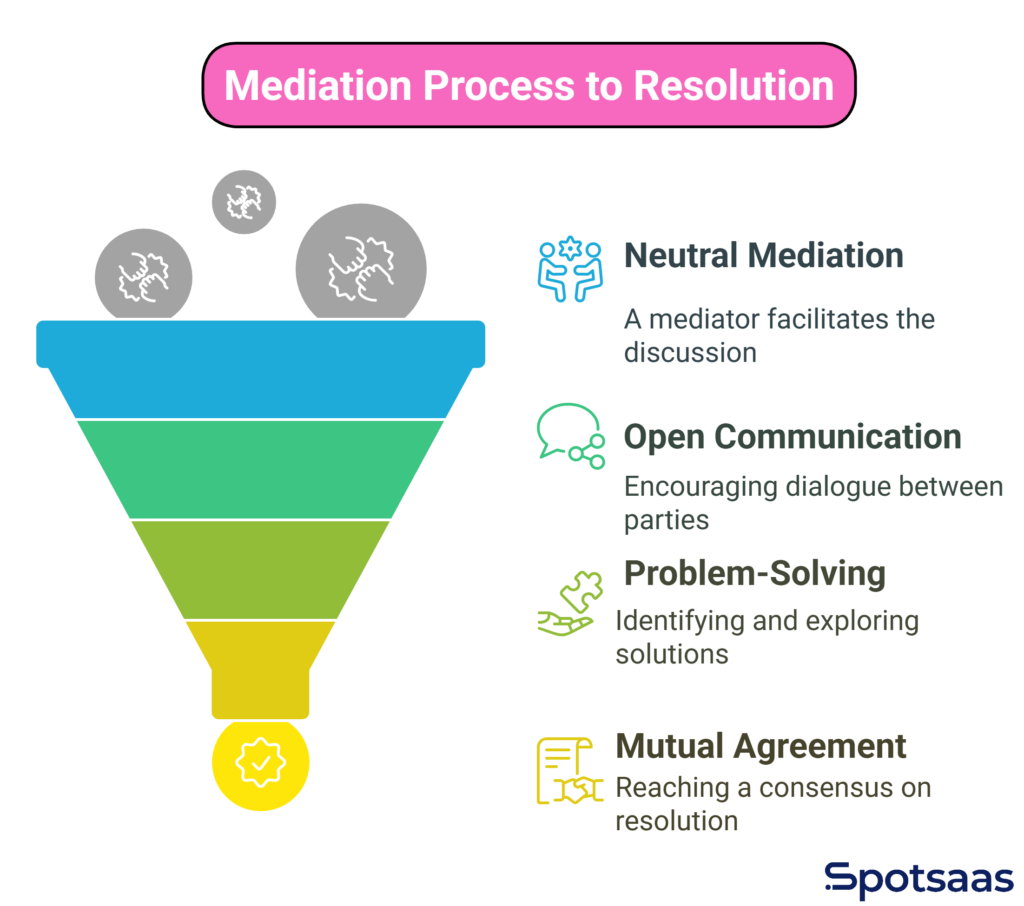
Benefits of Mediation
Voluntary Participation
Mediation is not forced upon any party; both sides must willingly engage. This voluntary nature ensures that all participants are motivated to find a fair resolution rather than compelled to follow a formal ruling. Parties can explore other legal options if an agreement cannot be reached.
Neutral and Impartial Process
The mediator does not take sides or offer personal opinions on the matter. Their primary role is to keep the discussion constructive and balanced, ensuring both parties feel heard and respected. This neutrality helps build trust and creates an environment for open dialogue.
Confidential and Informal Discussions
Unlike public court proceedings, Mediation remains private. This confidentiality makes it a preferred option for sensitive issues such as workplace conflicts, business negotiations, or family matters.
Because there are no rigid legal protocols, Mediation also feels more comfortable and less stressful for participants.
Encourages Open Communication
Mediation focuses on helping both sides communicate their concerns effectively. Promoting constructive dialogue prevents misunderstandings and allows parties to express their needs and expectations in a structured manner.
The goal is to reach a solution that benefits both parties rather than focusing on who is right or wrong.
Cost-Effective and Time-Saving
Mediation is a quicker and more affordable alternative to lengthy and expensive litigation. Court cases can take months or even years, while Mediation often resolves disputes in days or weeks.
The reduced costs make it an attractive option for individuals and businesses looking for a financially sensible way to settle disagreements.
Maintains Relationships
Many disputes arise between individuals or businesses that need to continue working together even after the issue is resolved.
Whether it’s a workplace conflict, a family dispute, or a business partnership disagreement, Mediation helps preserve relationships by reducing hostility and promoting understanding. Mediation encourages mutual respect unlike court battles, which can create lasting resentment.
Flexible and Customized Solutions
Mediation allows both parties to devise a solution that fits their needs rather than being bound by a judge’s ruling. The outcome can be tailored to the circumstances of the dispute, making it more practical and sustainable in the long run.
When to Choose Mediation
Mediation is a great choice when
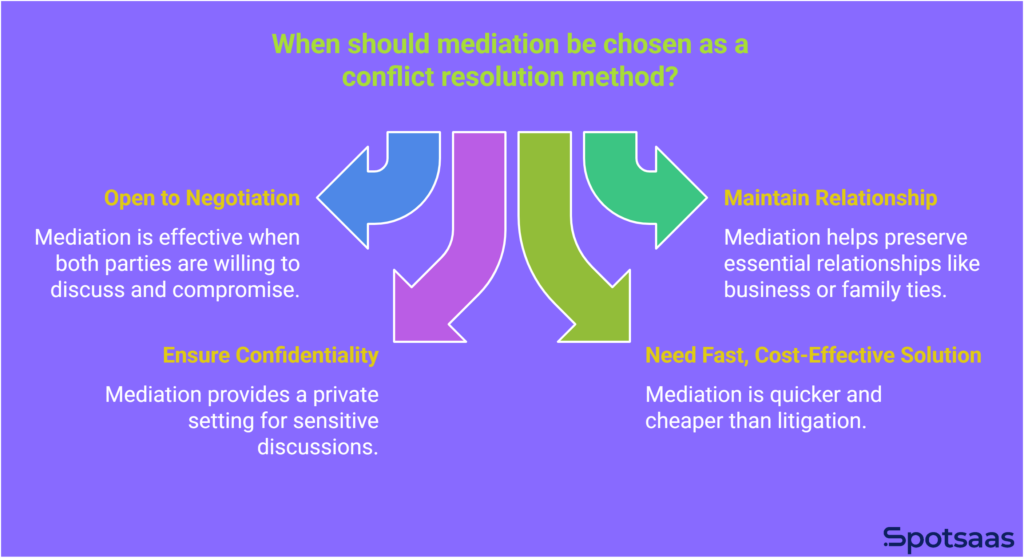
- Both parties are open to negotiation – Mediation works best when individuals or businesses are willing to discuss the issue and explore potential compromises. If one side is unwilling to cooperate, Mediation may not be the best choice.
- Maintaining a positive relationship is essential – Mediation helps preserve business partnerships, workplace relationships, and family ties. For example, in workplace conflicts, Mediation allows employees to resolve disagreements professionally without escalating the issue.
- Confidentiality is a priority – Many disputes, such as commercial contracts, business partnerships, and divorce settlements, involve sensitive information. Mediation provides a secure and private setting where parties can speak openly without concerns about public disclosure.
- A faster, cost-effective solution is needed – Mediation is quicker and more affordable than litigation. Court cases can take months or even years, while Mediation often resolves issues in days or weeks.
Mediation is a highly effective method for resolving disputes in a way that prioritizes fairness, efficiency, and mutual agreement.
It provides an opportunity to settle conflicts with minimal stress and disruption, making it a preferred choice for many individuals and organizations. Let me know if you need any further enhancements.
Pros and Cons of Mediation
Mediation promotes open communication and collaboration, allowing parties to control the outcome. It helps preserve relationships but relies on both sides being willing to negotiate.
| Pros | Cons |
|---|---|
| ✔ Encourages open dialogue and collaboration. | ✖ May not work if one party is unwilling to cooperate. |
| ✔ Gives parties full control over the outcome. | ✖ No external guidance—resolution depends entirely on the parties. |
| ✔ Helps preserve relationships, making it ideal for workplace and family disputes. | ✖ May take longer if both sides struggle to reach a compromise. |
| ✔ Flexible and confidential, ensuring privacy. | ✖ Agreements may not always be legally binding unless formalized. |
What is Conciliation?
Conciliation is a dispute resolution method where a neutral conciliator actively helps parties communicate, understand concerns, and reach a fair agreement. Unlike Mediation, the conciliator suggests solutions based on expertise.
Conciliation, commonly used in business, employment, consumer, and international trade disputes, provides structured guidance to resolve conflicts efficiently. It prevents misunderstandings, fosters cooperation, and offers a quicker, less stressful alternative to litigation while preserving relationships.

Benefits of Conciliation
A Voluntary and Collaborative Process
Conciliation is voluntary, meaning both parties agree to participate to find common ground. Unlike court proceedings, which often feel confrontational, Conciliation creates a cooperative environment where both sides have a voice in the resolution.
The conciliator ensures that discussions remain balanced and fair, helping both parties focus on solutions rather than disagreements.
Expert Guidance for Better Decision-Making
One of the most significant advantages of Conciliation is the involvement of an expert who understands the nature of the dispute. Whether it’s a business contract issue, an employment disagreement, or a consumer rights case, the conciliator offers valuable recommendations based on industry knowledge.
This expert input helps both sides evaluate their options more effectively, increasing the chances of reaching a resolution that works for everyone.
More Structure, Yet Still Flexible
Conciliation follows a structured approach, ensuring that discussions remain focused and productive. However, it is also flexible, allowing customized solutions that address the parties’ unique needs.
Unlike rigid legal proceedings, Conciliation allows negotiation and creative problem-solving, giving both sides greater control over the outcome.
Faster and More Cost-Effective Than Litigation
Legal disputes can be expensive and time-consuming, often lasting months or years. Conciliation, by streamlining the resolution process, provides a quicker and more affordable alternative.
Because the conciliator actively assists in finding solutions, disputes can often be settled within weeks, saving time and legal expenses. This makes Conciliation an attractive option for businesses and individuals looking to resolve conflicts efficiently.
Protects Business and Workplace Relationships
Disputes can strain professional and personal relationships, especially in workplaces, partnerships, and ongoing business collaborations. Unlike court cases, which can create lasting tension, Conciliation resolves issues while maintaining trust and cooperation between parties.
This is especially important in employment disputes, supplier agreements, and customer relations, where maintaining a positive working relationship is essential for future interactions.
Can Result in a Legally Recognized Agreement
Unlike Mediation, where agreements are informal unless separately legalized, conciliation agreements may carry legal weight depending on the jurisdiction and terms agreed upon.
If both parties settle, they may have additional legal protection, ensuring the agreement is followed. A structured and enforceable resolution adds security and peace of mind for those involved.
When to Choose Conciliation
Conciliation is a good option when:
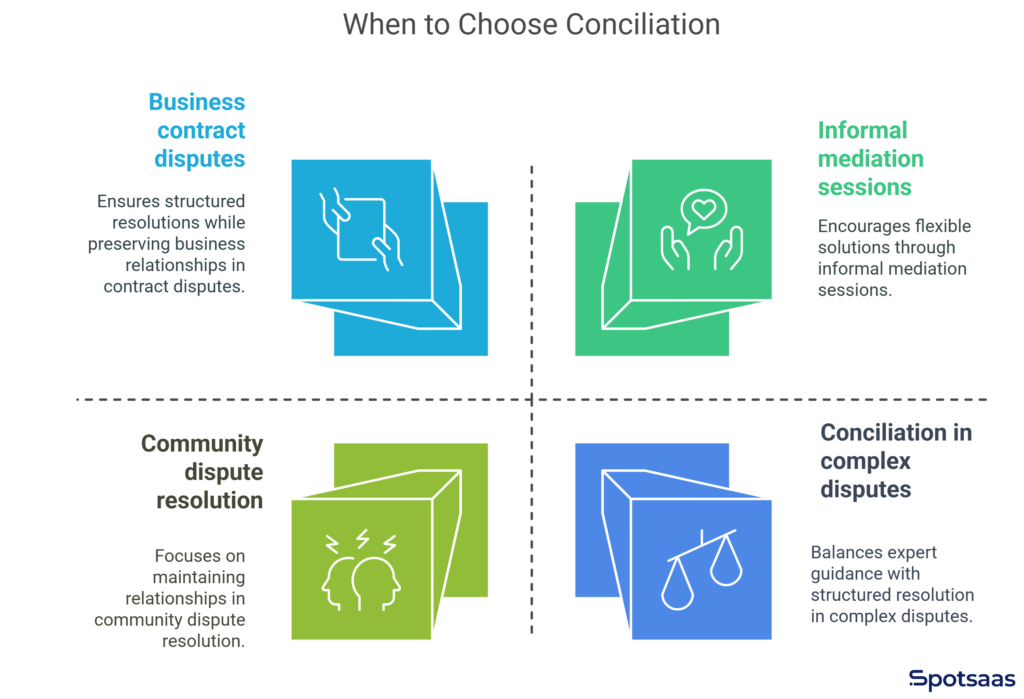
- The dispute requires expert recommendations to help both sides reach a fair resolution.
- A structured process is preferred over an informal discussion, but without the complexity of a court case.
- The parties want to preserve a business or professional relationship beyond the dispute.
- A legally recognized agreement is needed for added security and enforcement.
- A faster and more affordable alternative to litigation is the preferred choice.
Conciliation balances expert guidance with cooperative problem-solving, offering clear direction and practical solutions.
It’s structured yet flexible approach prevents conflicts from escalating while fostering understanding and fair resolutions for individuals and businesses.
Pros and Cons of Conciliation
Conciliation provides expert recommendations for structured dispute resolution. It is effective for technical conflicts but may feel less flexible than Mediation.
| Pros | Cons |
|---|---|
| ✔ Provides expert-driven solutions for faster resolution. | ✖ Some parties may feel the conciliator’s recommendations influence the outcome too much. |
| ✔ Useful for technical or industry-specific disputes. | ✖ Less flexibility compared to mediation due to a more structured approach. |
| ✔ Can lead to a structured agreement with enforceable terms. | ✖ Parties may rely too much on the conciliator rather than actively negotiating. |
| ✔ Offers professional recommendations to guide resolution. | ✖ Not ideal for disputes requiring a purely collaborative approach. |
Key Differences Between Mediation and Conciliation
Mediation facilitates open discussions, while Conciliation provides expert guidance and recommendations. The correct method is chosen depending on the level of involvement needed to resolve the dispute.
Understanding the distinctions between Conciliation and Mediation can help choose the best dispute resolution approach. Here’s a quick comparison:
| Factor | Mediation | Conciliation |
|---|---|---|
| Role of Neutral Party | Facilitator, guiding discussions | Active advisor, offering solutions |
| Suggests Solutions? | No, parties create their own | Yes, conciliator provides recommendations |
| Formality Level | Informal and flexible | Semi-structured with expert input |
| Legally Binding? | Usually not | Can be, depending on agreement |
| Best for | Preserving relationships and open dialogue | Complex disputes requiring expert guidance |
Examples For Mediation vs. Conciliation in Action
People connect better with realistic scenarios rather than just theoretical explanations. Here are some real-world examples of how mediation and conciliation work:
Example for Mediation:
“A tech company and its former employee had a disagreement over intellectual property rights. Instead of going to court, they opted for mediation. With the mediator facilitating structured discussions, they reached a confidential settlement that protected both the company’s interests and the employee’s contributions.”
Example for Conciliation:
“A manufacturing firm faced a supplier dispute over product quality. A conciliator with industry expertise stepped in, assessed the situation, and proposed fair contract amendments. Both parties accepted the solution, avoiding long-term financial loss.”
These examples showcase how both processes can be used in practical settings to achieve a resolution efficiently.
Practical Steps to Choose the Right Method
Choosing the proper dispute resolution method depends on factors such as the nature of the conflict, the level of involvement required from a neutral party, and the willingness of both parties to negotiate.
Below is a checklist with explanations to help guide your decision.
Need Expert Guidance? → Choose Conciliation
Conciliation is better if the dispute involves technical, legal, or industry-specific details. A conciliator provides structured guidance and expert recommendations based on their knowledge and experience.
This is especially useful in cases with complex subject matter, such as commercial contract disputes, employment disagreements, or industry-specific conflicts. The conciliator analyzes the situation and suggests practical solutions that align with legal or business standards.
Want to Maintain a Good Relationship? → Choose Mediation
Mediation is ideal when preserving relationships is essential, whether in a family dispute, workplace disagreement, or business partnership conflict. This method focuses on open discussions, allowing both parties to express their concerns in a respectful and controlled setting.
Mediation encourages collaboration rather than confrontation, making it a valuable option when ongoing communication and cooperation are necessary after resolving the dispute. It is often chosen for workplace conflicts, divorce settlements, and community disputes, where maintaining a positive relationship is a priority.
Prefer More Control Over the Outcome? → Choose Mediation
Mediation allows both parties to take an active role in resolving their dispute. The mediator facilitates discussions but does not impose solutions, meaning the final agreement is entirely up to the individuals involved.
This process provides greater flexibility, as participants can negotiate terms that best suit their needs rather than having a decision dictated by a third party. This makes Mediation a good choice for those who value autonomy and wish to reach an agreement on their terms while ensuring fairness.
Need External Recommendations? → Choose Conciliation
Conciliation is helpful when parties struggle to reach an agreement independently and require an external perspective to move the conversation forward. With their subject-matter expertise, the conciliator can analyze the dispute objectively and suggest solutions that the parties may not have considered.
This structured approach is particularly beneficial in cases where one or both parties lack clarity on their legal rights or contractual obligations. Conciliators provide practical recommendations based on laws, regulations, and best practices, helping both sides make informed decisions.
Is the Other Party Open to Discussion? → Choose Mediation
Mediation works best when both parties are willing to converse and find a mutually beneficial resolution. Since the mediator does not impose decisions, the success of the process depends on both sides’ willingness to listen, communicate, and negotiate.
If one party is unwilling to cooperate, Mediation may not be the most effective choice. However, when there is openness to discussion, Mediation offers a less confrontational, informal setting that allows both sides to work together toward a fair resolution.
Legal Recognition & Process
Mediation and Conciliation are widely accepted dispute resolution methods endorsed by governments and legal institutions as efficient alternatives to litigation.
While mediation agreements are typically informal unless legally formalized, conciliation settlements often hold legal standing, especially in commercial and employment disputes where structured recommendations can lead to binding contracts.
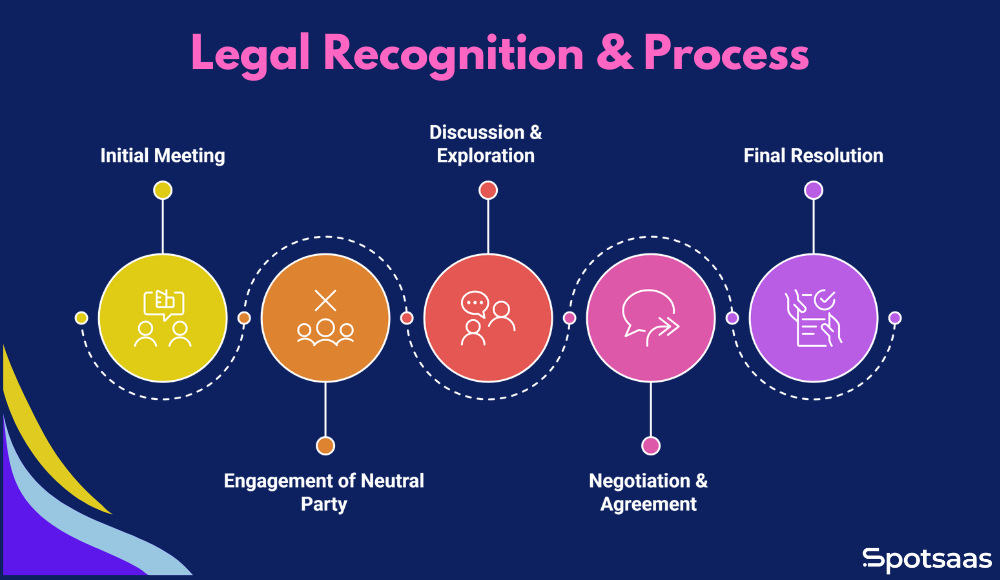
How the Process Works
1️⃣ Initial Meeting – Both parties come together to discuss the issue, clarify their concerns, and outline their expectations for the resolution process. This step ensures that everyone understands the goals and objectives before moving forward.
2️⃣ Engagement of a Neutral Party – A mediator or conciliator is selected to guide the discussions. They facilitate communication, create a balanced environment, and help the parties explore potential solutions.
3️⃣ Discussion & Exploration—Each side presents its viewpoints, shares relevant information, and identifies key issues. The neutral party ensures that both perspectives are acknowledged while working toward a constructive resolution.
4️⃣ Negotiation & Agreement – In Mediation, the resolution comes purely from the parties involved, with the mediator facilitating discussions. In Conciliation, the conciliator may provide structured recommendations based on their expertise to guide the parties toward an agreement.
5️⃣ Final Resolution – If an agreement is reached, it can be documented and signed. In Mediation, the deal is usually informal unless both parties choose to formalize it legally. In Conciliation, the final agreement may be legally binding, depending on jurisdiction and the terms set during the process.
By understanding these steps, individuals and businesses can navigate the resolution process smoothly, ensuring a fair and effective outcome that meets the needs of all parties involved.
Industry-Specific Use Cases
Applying mediation and Facilitation to real-world industries helps illustrate their effectiveness in resolving disputes. Below are key sectors where these methods are commonly used:
Corporate & Business Disputes
Mediation and Conciliation help businesses resolve conflicts related to vendor agreements, contract disputes, and employee grievances. These methods allow companies to maintain professional relationships while finding fair solutions without resorting to lengthy legal battles.
Family Law
Mediation provides a collaborative approach to resolving sensitive issues in divorce settlements, child custody disputes, and inheritance matters. It helps families reach agreements without the emotional and financial strain of litigation.
Workplace & Employment
Mediation or Conciliation can effectively resolve disputes between employees and employers, including HR grievances, discrimination claims, and wage-related issues. These methods foster open discussions while maintaining confidentiality and workplace harmony.
Consumer Disputes
Mediation and Conciliation are commonly used to resolve complaints between businesses and customers, such as product disputes, service disagreements, and contractual misunderstandings. These approaches offer a structured yet flexible process to ensure fairness for both parties.
International Trade & Diplomacy
Conciliation is particularly useful in cross-border disputes involving trade agreements, business partnerships, and international negotiations. It provides expert-driven recommendations to resolve conflicts while considering legal and regulatory differences between countries.
Understanding how mediation and Facilitation apply across different industries helps individuals and businesses choose the most suitable resolution method for their needs.
Conclusion
Both Mediation and Conciliation offer compelling alternatives to litigation. They help resolve disputes efficiently while maintaining professional and personal relationships. Mediation is best for collaborative discussions and flexible resolutions, whereas Conciliation is ideal for expert-driven guidance and structured agreements.
Choosing thecorrectt method depends on the complexity of the dispute, the level of expert input needed, and the willingness of both parties to negotiate. By understanding their differences, individuals and businesses can select the approach that best aligns with their goals, ensuring a fair and amicable resolution.
Understanding these distinctions is essential in selecting the most appropriate approach for conflict resolution.
FAQs
What is the main difference between Mediation and Conciliation?
Conciliation and Mediation are both nonjudicial processes, part of alternative dispute resolution methods in which a third party intervenes to help resolve issues. The main difference is that the third party provides suggestions in evaluative mediation.
Is either Conciliation or Mediation considered adversarial?
No, both conciliations and mediations fall under nonadversarial conflict management techniques which foster collaborative law practices.
How does facilitation come into play during these processes?
Facilitation by a neutral third party helps guide discussions for effective conflict management in both Conciliation and Mediation, which are alternative dispute resolution methods (ADR).
What code governs these forms of dispute resolution?
The Code of Civil Procedure typically governs these alternative forms of dispute resolution, including other kinds of third-party intervention.
Can mediation or Facilitation be used for workplace disputes?
Yes, both methods are widely used for resolving workplace conflicts, employee grievances, and HR disputes. Mediation helps maintain a collaborative work environment, while Conciliation provides structured solutions to workplace disagreements.

